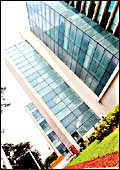 |
| RIL's Mukesh Ambani: He's
getting his biotech baby to focus on innovation in chosen
areas and come up with winning drugs |
The
idea took shape in 2001. a group of senior executives guided by
Mukesh Ambani were making a presentation to the group's Founder-Chairman
Dhirubhai Ambani. The patriarch listened attentively as the team
explained the nuances and extolled the potential of biotechnology.
Mukesh Ambani, who was also present, told his father that the
project could change the way healthcare was administered in the
country and, possibly, the world. Dhirubhai, who had not spoken
a word through the two-hour presentation, turned to his son once
it was over and said: "Mukesh, yeh karne ka hai (Mukesh,
we have to be in this business)."
Five years later, the grand vision that spawned
Reliance Life Sciences (RLS) is still work-in-progress, albeit
at a much more advanced state of progress. Says Mukesh Ambani,
CMD of RIL and RLS: "Life sciences is a business we are building
for the future and we envisage it coming into full bloom towards
the end of this decade."
Biotechnology has few apparent synergies
with Reliance's existing lines of business; so looking for similarities
is likely to be a futile exercise; but it fits snugly into the
Reliance way of doing things: it is a global business from Stage
I itself, is hugely scaleable and requires humungous investments
upfront. And the way RLS has structured itself allows for high
levels of synergy between its various components (see The Initiatives).
Says RLS President K.V. Subramaniam: "This is an evolving
business that is driven by knowledge and people relatively more
than capital and manufacturing." And RLS is now at the most
interesting phase of its life.
"So far, we had concentrated on building
basic competencies, programmes and infrastructure in life sciences;
now we are engaged in looking at scaling up the initiative,"
says Ambani. The objective is clear: look for areas where RLS
has an advantage and scale up operations to global standards (see
Global Pharmaceutical Market). It is, after all, one of 10 institutions
named by the National Institutes of Health, us, in 2001 as having
established embryonic stem cell lines (undifferentiated cells
that can be manipulated to grow into, say, a liver or a kidney
or a patch of skin, which can then be used to replace a damaged
organ or burnt patch of skin). But this line of research, the
Holy Grail of the bio-tech sector, is still years from yielding
marketable products.
 |
 |
| RLS' K.V. Subramaniam: Global gambit |
RLS' biotech wing: Scaling up |
RLS' current product portfolio (see The Starters)
is used in areas such as neurosurgeries, plastic surgeries and
primary immunodeficiencies. "We have a rich pipeline of products
and services which will encompass areas such as cell-based therapies,
plasma proteins, recombinant proteins-both generic and novel-bio-polymers
and bio-fuels," says Subramaniam. The Reliance USP: Its products
are 30-40 per cent cheaper than their imported substitutes. But
these are just the starters. The main course that is scheduled
to follow is currently being cooked by its team of 140 researchers
(total staff strength is more than 500, which is expected to rise
to 2,000 by 2008)-Ph.Ds, MDs and post-graduate scientists, including
some expatriates-is more exciting. That's because this phase is
all about translating the research findings into marketable products.
"This is a critical phase-we are answerable to the management
and also to ourselves. The last four years have been about planning
for what the industry and the world at large wants and developing
technologies. Now is the time to scale up," says Dr Chandra
Viswanathan, Vice-President (Biologics), RLS. Adds Carlyle India's
Managing Director and Head of its India Buyout Team, Rajeev Gupta,
who has been involved in several deals in this sector: "Research
is not about scale; this phase is about managing R&D programmes;
success critically depends on knowledge sharing and managing R&D
programmes."
The Numbers Game
No business is worthwhile till it generates
healthy cash flows and profits. "This is a capital-intensive
business with long incubation periods; and the market for life
science products is still evolving," points out Megha Dhargalkar,
Vice-President (Business Development), RLS. It is also a highly
regulated industry with stringent guidelines in areas like Good
Lab Practices (GLP), Good Clinical Practices (GCP) and Good Manufacturing
Practices (GMP). So clearly, innovative business models are the
need of the hour. Says Utkarsh Palnitkar, Industry Leader, Health
Sciences, Ernst & Young: "A hybrid model using India's
expertise in the area of development with overseas expertise in
research could be an option. But eventually, players must have
a long-term perspective and high levels of perseverance."
There is no official figure on how much RLS
has invested so far, but the broad sense is that it is "several
hundred crores" and still counting. Revenues have also started
flowing in over the last year-and-a-half-again the company did
not share figures; it is privately held and so, doesn't have to
declare numbers-and the objective now is to break even over the
next few years. "That will be an achievement for a greenfield
research-driven biotech company like ours," says Subramaniam.
In this context, Gupta adds that the capital-intensive nature
of the business is why Indian companies do not have a large presence
in the bio-tech sector.
| THE STARTERS |
ReliPlasma
WHAT IS IT: India's first and only virus-inactivated
plasma
USE: Multiple clotting factor deficiency (Used for
patients with deficiency of factors that are responsible for
clotting of blood)
ADVANTAGES
» Safety:
No risk of HIV or Hepatitis B/C transmission
Indigenously manufactured in World Health Organization (WHO)
GMP (good manufacturing practices) approved facility
ReliSeal
WHAT IS IT: Haemostatic agent and biological glue
for effective sealing during surgery
USE: To arrest capillary bleeding as well as act
as a biological glue during neurosurgeries, plastic surgeries,
cancer surgeries and orthopedic surgeries
ADVANTAGES
» Reduces
post-operative bleeding and complications
» Shortens
hospital stay
» Allows
for faster healing of wounds
AlbuRel
WHAT IS IT: Human Normal Albumin
USE: It helps maintain fluid volumes in the body
and is used in patients with burns, liver cirrhosis of liver,
sepsis and patients who have undergone major surgeries
ADVANTAGES
» Indigenously
manufactured albumin in WHO GMP approved facility; this
results in lower costs and easier availability
ImmunoRel
WHAT IS IT: Normal Immunoglobulin
USE: This is used for patients with immune deficiencies,
some types of cancers and to treat HIV infection in paediatric
patients
ADVANTAGES
» Indigenously
manufactured in WHO GMP approved facility; this results
in lower costs and easier availability
HemoRel-ATM
WHAT IS IT: Dried Factor VIII (an anti-hemolytic
factor)
USE: For patients with haemophilia who have deficiency
of Factor-VIII which is responsible for the clotting of
blood
ADVANTAGES
» The
only indigenously manufactured Factor VIII
» Uninterrupted
availability of product is assured which is a critical factor
in the management of haemophiliac patients
|
There are, of course, a couple of areas of
concern. The most important of these is people; getting the right
people is a major issue here, as in many other industries. The
issue is trickier here since biotech has space mostly for those
only at the top end of the education scale. But Reliance is looking
in the right places. "There is a lot of talent in government
laboratories," says Palnitkar.
Then, there is the competition from global
biggies with much deeper pockets and more experience than Reliance.
Little wonder then that RLS is alive to the need to constantly
innovate and reinvent itself. "Most of what we have done
so far has not been tried before by anybody. In that sense, there
are no precedents," explains Dhargalkar. RLS' approach is
completely driven by innovation in key areas like research, competency
development and people-related best practices. The goal? "What
will make us happy is when a patient comes to us with leukemia
or any other disease and we tell him that we have an answer for
it," says Viswanathan. "Over the next 2-3 years, we
will have more products in the market, scale up our initiatives
and globalise these initiatives," says Subramaniam. And given
Ambani's penchant for global scales, acquisitions remain a distinct
possibility.
The way forward looks exciting. Everyone
in the company points out that it will have to keep the engine
of innovation going, develop competencies in its areas of specialisation,
achieve sustained profitability quickly and, finally, adopt the
path of globalisation. When Ambani addressed his shareholders
last year, he had spoken of Reliance Industries' plans to incubate,
through life sciences, an innovation-driven bio-technology business
and said: "RIL will strive to help India make a global mark
in life sciences." Life sciences, according to him, will
bring to the table advantages like stable cash flows, build strong
services-based revenues and fashion a knowledge-driven business.
Ambani has never been known to think small and every project he
has been involved with has been driven by the larger vision of
making it a huge business over time. RLS is still in its early
phase and it is highly likely that Ambani's vision for the company
could just see it entering a different growth trajectory. The
world is watching this phase closely.
|







